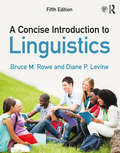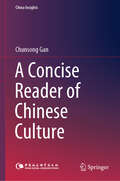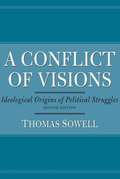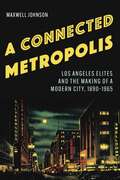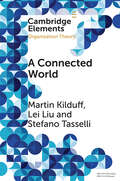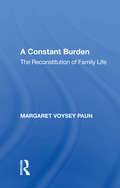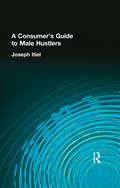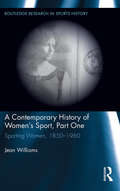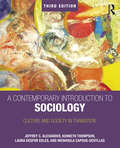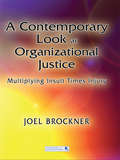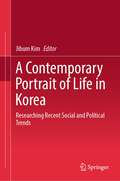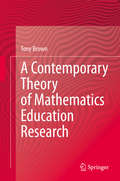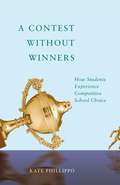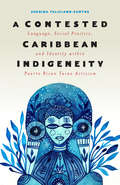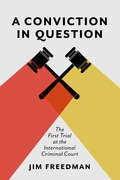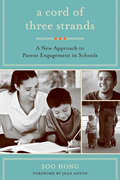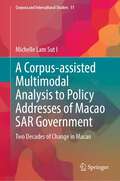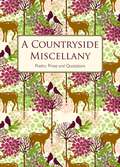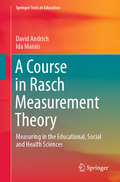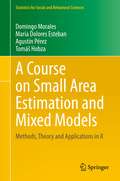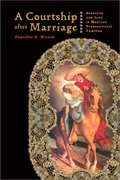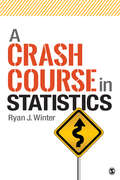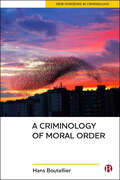- Table View
- List View
A Concise Introduction to Linguistics (Myanthrokit Ser.)
by Bruce M. Rowe Diane P. LevineNow in its fifth edition, A Concise Introduction to Linguistics provides students with a detailed introduction to the core concepts of language as it relates to culture. The textbook includes a focus on linguistic anthropology, unpacking the main contributions of linguistics to the study of human communication and culture. Aimed at the general education student, the textbook also provides anthropology, linguistics, and English majors with the resources needed to pursue advanced courses in this area. Written in an accessible manner that does not assume previous knowledge of linguistics, this new edition contains expanded discussions on linguistic anthropology, sociolinguistics (including a section on gender and language), and pragmatics. The textbook incorporates a robust set of pedagogical features including marginal definitions, a substantial glossary, chapter summaries, and learning exercises. Brand new to this edition are suggested reading lists at the end of every chapter, and recommended websites and apps to further aid students in their study.
A Concise Reader of Chinese Culture (China Insights)
by Chunsong GanThis book uses the mutual interactions between Chinese and Western culture as a point of departure in order to concisely introduce the origins and evolution of Chinese culture at the aspects of constitution, thinking, values and atheistic. This book also analyzes utensil culture, constitution culture and ideology culture, which were perfected by absorbing classic arguments from academia. As such, the book offers an essential guide to understanding the development, civilization and key ideologies in Chinese history, and will thus help to promote Chinese culture and increase cultural awareness.
A Conflict of Visions: Ideological Origins of Political Struggles
by Thomas SowellIn this classic work, Thomas Sowell analyzes the two competing visions that shape our debates about the nature of reason, justice, equality, and power. The "constrained" vision, which sees human nature as unchanging and selfish, and the "unconstrained" vision, in which human nature is malleable and perfectible. He describes how these two radically opposed views have manifested themselves in the political controversies of the past two centuries, including such contemporary issues as welfare reform, social justice, and crime. Updated to include sweeping political changes since its first publication in 1987, this revised edition of A Conflict of Visions offers a convincing case that ethical and policy disputes circle around the disparity between both outlooks.
A Connected Metropolis: Los Angeles Elites and the Making of a Modern City, 1890–1965
by Maxwell JohnsonIn A Connected Metropolis Maxwell Johnson describes Los Angeles&’s rise in the early twentieth century as catalyzed by a series of upper-class debates about the city&’s connections to the outside world. By focusing on specific moments in the city&’s development when tensions over Los Angeles&’s connections, or lack thereof, emerged, Johnson ties each movement to two or three contemporary figures who influenced the debates at hand. The elites&’ previous efforts to secure nationwide and global connections for Los Angeles were wildly successful following World War II. As a result, the city became a landing spot for African American migrants, Cambodian and Laotian refugees, and Mexican and Central American immigrants. Johnson argues that the city&’s history is more defined by external relationships than previously understood, and those relationships have given the history of the city more continuity than originally recognized. At the turn of the twentieth century, the politics of connection revolved around initiatives to tie Los Angeles to other places both tangibly and metaphorically. Elites built tangible connections to secure, among other things, the water that irrigated the citrus farms of Los Angeles, the capital that propelled its businesses, and the people who migrated from the Midwest to buy its houses. To build metaphorical connections that located the city amid transcontinental and trans-Pacific movements, elites themselves often transcended nearby borders and pursued connections at will. Los Angeles stood as a focal point for elite ambitions, a place with a more ambivalent relationship to external connections. The true story of Los Angeles&’s rise lies in the spectacular visions and rambunctious activism of a group of elite men dedicated to transforming a remote frontier town into a global metropolis.
A Connected World: Social Networks and Organizations (Elements in Organization Theory)
by Martin Kilduff Lei Liu Stefano TasselliThis Element synthesizes the current state of research on organizational social networks from its early foundations to contemporary debates. It highlights the characteristics that make the social network perspective distinctive in the organizational research landscape, including its emphasis on structure and outcomes. It covers the main theoretical developments and summarizes the research design questions that organizational researchers face when collecting and analyzing network data. Then, it discusses current debates ranging from agency and structure to network volatility and personality. Finally, the Element envisages future research directions on the role of brokerage for individuals and communities, network cognition, and the importance of past ties. Overall, the Element provides an innovative angle for understanding organizational social networks, engaging in empirical network research, and nurturing further theoretical development on the role of social interactions and connectedness in modern organizations.
A Constant Burden: The Reconstitution of Family Life (Ashgate Classics In Sociology Ser.)
by Margaret Voysey PaunFirst published in 1975, A Constant Burden was a truly ground-breaking text in the field of medical sociology and has since become an undisputed classic. Over thirty years later this revised edition gives new life to this important work. It contains the same seminal study of families with a disabled child, based on an analysis of interviews with parents about the effects of their child's disability on their family life. Whereas much of the contemporary research assumed that the presence of such a child must constitute a problem, and attempted to read parents' responses as indicators of the family's psychological and social adjustment to this 'reality', Voysey Paun's analysis takes a radically different stance. She shows that what parents say should rather be understood as socially constructed accounts of 'normal parenting' which induce others to identify them as properly fulfilling their responsibilities as good parents. Voysey Paun's approach to the analysis and interpretation of interview responses has become a much more central theme for sociological research, instrumental in changing theories about the nature of disability and the family as expressed by sociologists, social workers and other agencies. The revised edition contains a new introduction which puts the study in its intellectual context. It will be essential reading in the sociology of health and illness, and will also be of interest to social workers and other professionals concerned with disability and family life.
A Consumer's Guide to Male Hustlers
by Joseph ItielA Consumer’s Guide to Male Hustlers gives you exciting insight into all you ever wanted to know about hustlers but were too embarrassed to ask. You’ll find answers to questions such as where and how to find hustlers, how much to pay them, and how to make it an experience that is satisfying to both parties. Author Joseph Itiel shares with readers his personal experiences and observations, describing his dealings with hustlers, over a period of about 35 years, in many different countries.Throughout A Consumer’s Guide to Male Hustlers, Itiel narrates personal anecdotes, lending an intimate dimension to his general observations. He describes the hustler scene in the United States and abroad, dispelling many erroneous notions about hustlers by addressing such topics as: under what circumstances sex-for-money arrangements are exploitative (a comparison of male hustlers and female prostitutes) emotional involvement and control between clients and hustlers the notion that hustlers are only for the wealthy whether or not hustlers are likely carriers of sexually transmitted diseases whether or not it is dangerous to pick up hustlers why hustlers hustle the differences between street hustlers, models (or escorts), and masseurs legal issues associated with hustling regular sessions with hustlers as an emotional and libidinal sedativeIt is the contention of the author that hustlers are an under-used resource in the gay community, especially valuable to those with a vigorous sex appetite but no steady partner. This opportunity is often shunned because potential clients feel guilty about hiring hustlers. The author hopes that by reading this book, you will come to understand that the hustler experience, meeting with hustlers regularly, can be mutually exciting and satisfying for both parties.
A Contemporary History of Women's Sport, Part One: Sporting Women, 1850-1960 (Routledge Research in Sports History #3)
by Jean WilliamsThis book is an historical survey of women’s sport from 1850-1960. It looks at some of the more recent methodological approaches to writing sports history and raises questions about how the history of women’s sport has so far been shaped by academic writers. Questions explored in this text include: What are the fresh perspectives and newly available sources for the historian of women’s sport? How do these take forward established debates on women’s place in sporting culture and what novel approaches do they suggest? How can our appreciation of fashion, travel, food and medical history be advanced by looking at women’s involvement in sport? How can we use some of the current ideas and methodologies in the recent literature on the history and sociology of sport in order to look afresh at women’s participation? Jean Williams’s original research on these topics and more will be a useful resource for scholars in the fields of sports, women’s studies, history and sociology.
A Contemporary Introduction to Sociology: Culture and Society in Transition
by Jeffrey C. Alexander Kenneth Thompson Moshoula Capous-Desyllas Jeffrey Alexander Laura Desfor EdlesThe influential authors significantly update their popular introductory text that invites students to reflect on their lives in the context of the combustible leap from modern to postmodern life. The authors show how culture is central to understanding many world problems as they challenge readers to confront the problems and possibilities of an era in which the futures of the physical and social environments seem uncertain. As culture rapidly changes in the 21st century, the authors have successfully incorporated these nuances with many important updates on race and racism, Black Lives Matter, the rise of populist politics, ISIS, new social media, feminist perspectives on sex work, trans and non-gender conforming identities, and more. New to this edition: New data, text box examples, photos, exercises, study questions, and glossary terms appear throughout. New discussions added of arts-based and participatory approaches to research, historical changes in the perception of deviance, legalization of marijuana; Islam vs. secularism in France, new forms of socialization, heteronormative and essentialist language related to sex and gender, intersections of social class and other identities, the prison industrial complex, informal sharing economies, atheism, and more. New text boxes include: Young Saudis Find Freedom in their Phones; How One Stupid Tweet Blew Up Justine Sacco’s Life; School-to-Prison Pipeline; India’s Reproductive Assembly Line; Workers Feel Pain of Layoffs; Like Prohibition, the fight over guns is about something else; and Micro-aggression and Changing Moral Cultures.
A Contemporary Look at Organizational Justice: Multiplying Insult Times Injury (Organization and Management Series)
by Joel BrocknerThis book is for scholars with an interest in the burgeoning area of theory and research on organizational justice. The ideas it describes forge connections between the justice literature and other prominent bodies of knowledge in organizational and social psychology, including those pertaining to trust, social identity, attribution theory, regulatory focus theory and cross-cultural differences in people's beliefs and behaviors. Though intended primarily for researchers, this book is written in a very accessible way, so that informed practitioners will gain considerable value from it.
A Contemporary Portrait of Life in Korea: Researching Recent Social and Political Trends
by Jibum KimThis book delves into the values, attitudes, and behaviours of Koreans over the course of the past twenty years. Compiled by leading Korean scholars, the book uses the Korean General Social Survey (KGSS), the most comprehensive source of information detailing recent continuity and change in Korea, and addresses a diverse, wide-range of topics such as nationalism, familyism, social inequality, politics, religion, welfare, trust, attitudes towards North Korea, and attitudes towards sex. These issues, in continuously shaping and influencing the lives of Koreans, deserve further examination so as to fully grasp a deeper understanding of Korean contemporary culture. Each chapter covers an overview of background information about the chapter subject and then compares Korean attitudes to those of other countries, drawing on cross-national data derived from sources such as the International Social Survey Programme (ISSP) and the East Asian Social Survey (EASS). It collates this data and then unpacks it to demonstrate trends and how they are impacted by stability or change. Despite the rapid economic development and democratization in Korea, it remains difficult to pinpoint common denominators regarding recent social trends in Korea, and there are surprisingly few books that present a current, nuanced, and empirically substantiated scholarly depiction of Koreans and their social issues. This book fills this gap in serving as an indispensable reference for students and scholars interested in the diverse issues in Korean society.
A Contemporary Theory of Mathematics Education Research
by Tony BrownThis book by-passes both psychology and sociology to present an original social theory centered on seeing mathematical learning by everyone as an intrinsic dimension of how mathematics develops as a field in support of human activity. Here, mathematics is defined by how we collectively talk about it. Drawing on psychoanalytic theory, the student is seen as participating in the renewal of mathematics through their contributions to our collective gaze on mathematics as the field responds to ever new demands. As such learning takes a critical stance on the standard initiations into current practices often promoted by formal education.In the field of mathematics education, researchers have moved from psychology where individual students were seen as following natural paths of development through existing mathematical knowledge, to socio-cultural models predicated on students being initiated into the human world and understood through the reflective gazes this world has of itself, such as those found in comparisons of student learning in different countries. This book addresses the domain, purpose and functioning of contemporary research in mathematics education and is an original contribution to this theme.The book is aimed at a mathematics education research audience. It continues a dialogue with existing publications, seen widely as a cutting edge and will also be of interest to students and practitioners in the fields of qualitative research, social theory and psychology.
A Contest without Winners: How Students Experience Competitive School Choice
by Kate PhillippoSeeing the consequences of competitive school choice policy through students&’ eyesWhile policymakers often justify school choice as a means to alleviate opportunity and achievement gaps, an unanticipated effect is increased competition over access to coveted, high-performing schools. In A Contest without Winners, Kate Phillippo follows a diverse group of Chicago students through the processes of researching, applying to, and enrolling in public high school. Throughout this journey, students prove themselves powerful policy actors who carry out and redefine competitive choice.Phillippo&’s work amplifies the voices of students—rather than the parents, educators, public intellectuals, and policymakers who so often inform school choice research—and investigates how students interact with and emerge from competitive choice academically, developmentally, and civically. Through students&’ experiences, she shows how competitive choice legitimates and exacerbates existing social inequalities; collides with students&’ developmental vulnerability to messages about their ability, merit, and potential; and encourages young people&’s individualistic actions as they come to feel that they must earn their educational rights. From urban infrastructure to income inequality to racial segregation, Phillippo examines the factors that shape students&’ policy enactment and interpretation, as policymakers and educators ask students to compete for access to public resources.With competitive choice, even the winners—the lucky few admitted to their dream schools—don&’t outright win. A Contest without Winners challenges meritocratic and market-driven notions of opportunity creation for young people and raises critical questions about the goals we have for public schooling.
A Contested Caribbean Indigeneity: Language, Social Practice, and Identity within Puerto Rican Taíno Activism (Critical Caribbean Studies)
by Sherina Feliciano-SantosA Contested Caribbean Indigeneity is an in-depth analysis of the debates surrounding Taíno/Boricua activism in Puerto Rico and the Caribbean diaspora in New York City. Drawing on in-depth ethnographic research, media analysis, and historical documents, the book explores the varied experiences and motivations of Taíno/Boricua activists as well as the alternative fonts of authority they draw on to claim what is commonly thought to be an extinct ethnic category. It explores the historical and interactional challenges involved in claiming membership in, what for many Puerto Ricans, is an impossible affiliation. In focusing on Taíno/Boricua activism, the books aims to identify a critical space from which to analyze and decolonize ethnoracial ideologies of Puerto Ricanness, issues of class and education, Puerto Rican nationalisms and colonialisms, as well as important questions regarding narrative, historical memory, and belonging.
A Conviction in Question: The First Trial at the International Criminal Court
by Jim FreedmanA lively narrative account of the first case to appear at the International Criminal Court, A Conviction in Question documents the trial of Union of Congolese Patriots leader and warlord, Thomas Lubanga Dyilo. Although Dyilo’s crimes, including murder, rape, and the forcible conscription of child soldiers, were indisputable, legal wrangling and a clash of personalities caused the trial to be prolonged for an unprecedented six years. This book offers an accessible account of the rapid evolution of international law and the controversial trial at the foundation of the International Criminal Court. The first book to thoroughly examine Dyilo’s trial, A Conviction in Question looks at the legal issues behind each of the trial’s critical moments, including the participation of Dyilo’s victims at the trial and the impact of witness protection. Through eye-witness observation and analysis, Jim Freedman shows that the trial suffered from all the problems associated with ordinary criminal law trials, and uses Dyilo’s case to further comment on the role of international courts in a contemporary global context.
A Cord of Three Strands: A New Approach to Parent Engagement in Schools
by Soo HongHow can low-income, non-English-speaking parents become advocates, leaders, and role models in their children&’s schools? A Cord of Three Strands offers a close study of the Logan Square Neighborhood Association, a grassroots organization on the northwest side of Chicago, whose work on parent engagement has drawn national attention. The author identifies three elements—induction, integration, and investment—that together capture the dynamic and developmental nature of successful parent engagement. Writing with both optimism and urgency, author Soo Hong offers richly detailed portraits of parents&’ experiences and addresses the complex and sometime conflicting relationships among school, family, and community.
A Corpus-assisted Multimodal Analysis to Policy Addresses of Macao SAR Government: Two Decades of Change in Macao (Corpora and Intercultural Studies #11)
by Michelle Lam Sut IThis book introduces an integrated framework with corpus-assisted approach to deal with large set of data of discourse with multimodal factors to investigate how policy addresses (the government reports of Macao SAR) as a discourse type function in the social changes of Macao SAR through discussing the social factors to the production and consumption of policy addresses. The book explores research models or methodology in dealing with the contemporary topics in translation studies with a detailed presentation of the application of an analytical framework which marries corpus-assisted analysis, discourse analysis from socio-cultural perspective and multimodality with translation studies. Withal, the book is with the chapters to review the development of the social approach to discourse analysis and to introduce the stories of Macao with the summary of the development of this special region, in academic field, political and cultural fields.
A Countryside Miscellany
by Isobel CarlsonLovers of the great outdoors will be inspired by this miscellany of quotations, poems and beautiful prose celebrating the natural world. From Elizabeth von Arnim to Oscar Wilde, this charming collection explores every aspect of the countryside, from the first bluebells of spring to a hilltop walk on a crisp winter’s day.
A Countryside Miscellany
by Isobel CarlsonLovers of the great outdoors will be inspired by this miscellany of quotations, poems and beautiful prose celebrating the natural world. From Elizabeth von Arnim to Oscar Wilde, this charming collection explores every aspect of the countryside, from the first bluebells of spring to a hilltop walk on a crisp winter’s day.
A Course in Rasch Measurement Theory: Measuring in the Educational, Social and Health Sciences (Springer Texts in Education)
by David Andrich Ida MaraisThis book applies Rasch measurement theory to the fields of education, psychology, sociology, marketing and health outcomes in order to measure various social constructs. The chief focus is on first principles of both the theory and its applications. Because software is readily available to carry out analyses of real data, numerous small examples are provided in the book. The software used in these examples, and which is helpful in working through the text, is RUMM2030 (Rasch unidimensional models for measurement).The book’s main goals are to equip researchers with the confidence they need in order to be in control of the analysis and interpretation of data, and to make professional rather than primarily statistical decisions mechanically. Because statistical principles are necessarily involved, reviews of the requisite statistics are provided in the Appendix.The content is based on courses that have been taught both online and in intensive form for over two decades. Although first principles are emphasised, much of the book is based on research conducted by the two authors and their colleagues.
A Course on Small Area Estimation and Mixed Models: Methods, Theory and Applications in R (Statistics for Social and Behavioral Sciences)
by Domingo Morales María Dolores Esteban Agustín Pérez Tomáš HobzaThis advanced textbook explores small area estimation techniques, covers the underlying mathematical and statistical theory and offers hands-on support with their implementation. It presents the theory in a rigorous way and compares and contrasts various statistical methodologies, helping readers understand how to develop new methodologies for small area estimation. It also includes numerous sample applications of small area estimation techniques. The underlying R code is provided in the text and applied to four datasets that mimic data from labor markets and living conditions surveys, where the socioeconomic indicators include the small area estimation of total unemployment, unemployment rates, average annual household incomes and poverty indicators. Given its scope, the book will be useful for master and PhD students, and for official and other applied statisticians.
A Courtship after Marriage: Sexuality and Love in Mexican Transnational Families
by Jennifer S. HirschThis is one of the very first volumes exploring the lives, private or otherwise, of migrants in the American Southeast. Given recent census results, which showed enormous growth in Mexican migration to the Southeastern US, this provides an intimate look at a group of our new neighbors about whom very little is known.
A Crash Course in Statistics
by Ryan J. WinterA Crash Course in Statistics is a short introduction to key statistical methods including descriptive statistics, one-way and two-way ANOVA, the t-test, and Chi Square. Each of the five chapters provides an overview of each method, and then walks readers through a relevant example, using SPSS to highlight how to run the statistics and how to write up the results in APA style. Each chapter ends with a self-quiz so that readers can assess their understanding of each statistical concept. This "crash course" supplement is a must-have statistics refresher for students taking research methods classes; a handy additional reference for introductory statistics students; and a guide for anyone who needs to be a consumer of statistics.
A Crash Course in Statistics
by Ryan J. WinterA Crash Course in Statistics is a short introduction to key statistical methods including descriptive statistics, one-way and two-way ANOVA, the t-test, and Chi Square. Each of the five chapters provides an overview of each method, and then walks readers through a relevant example, using SPSS to highlight how to run the statistics and how to write up the results in APA style. Each chapter ends with a self-quiz so that readers can assess their understanding of each statistical concept. This "crash course" supplement is a must-have statistics refresher for students taking research methods classes; a handy additional reference for introductory statistics students; and a guide for anyone who needs to be a consumer of statistics.
A Criminology of Moral Order (New Horizons in Criminology)
by Hans BoutellierMoral order is disturbed by criminal events. However, in a secularized and networked society a common moral ground is increasingly hard to find. People feel confused about the bigger issues of our time such as crime, anti-social behaviour, Islamist radicalism, sexual harassment and populism. Traditionally, issues around morality have been neglected by criminologists. Through theory, case studies and discussion, this book sheds a new and topical light on these concerns. Using the moral perspective, Boutellier bridges the gap between people’s emotional opinions on crime, and criminologists' rationalized answers to questions of crime and security.
